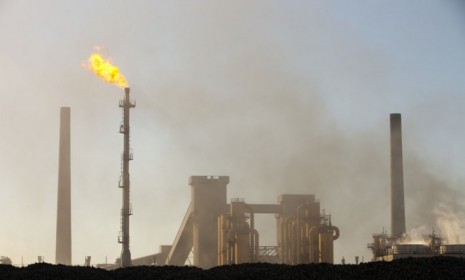Has climate change 'blocked' the next ice age?
Carbon dioxide emissions might warm the planet enough to keep Earth from once again becoming a frozen wasteland

A free daily email with the biggest news stories of the day – and the best features from TheWeek.com
You are now subscribed
Your newsletter sign-up was successful
Earth isn't due for another ice age for 1,500 years. But by then, say researchers from Cambridge University, carbon dioxide emissions appear likely to have raised the planet's temperature so much that the ice sheets will be unable to form. Will climate change "block" the next ice age? Here, a brief guide:
Wait — an ice age?
Yup. The planet experiences regular ice ages — scientists have discovered evidence of five of them — and we're due for another one. "The period between the end of an ice age and the beginning of the next is typically about 11,000 years," says Britain's Telegraph, "due to a natural cycle related to the Earth's orbit."
The Week
Escape your echo chamber. Get the facts behind the news, plus analysis from multiple perspectives.

Sign up for The Week's Free Newsletters
From our morning news briefing to a weekly Good News Newsletter, get the best of The Week delivered directly to your inbox.
From our morning news briefing to a weekly Good News Newsletter, get the best of The Week delivered directly to your inbox.
So when is this one supposed to hit?
Around A.D. 3500, "the world will be due for another round of chilling and frozen wastelands," says the International Business Times. We're actually already overdue — it has been 11,600 years since the last ice age. But scientists determined that we're still 1,500 years out by comparing current conditions to a similar period between ice ages 780,000 years ago.
And this next one might not hit?
Probably not — at least not with current concentrations of carbon dioxide in the atmosphere. For the next ice age to hit, CO2 levels would have to fall to 250 parts per million by volume. Right now? The current carbon dioxide concentration is 390 ppmv — and at that level, the ice sheets just can't expand.
A free daily email with the biggest news stories of the day – and the best features from TheWeek.com
So that's a good thing, right?
Not exactly. Man-made climate change could have "huge consequences" for the planet, says study leader Dr. Luke Skinner. And the argument that CO2 emissions might be helping the planet is "missing the point."
Sources: International Business Times, National Post, Telegraph